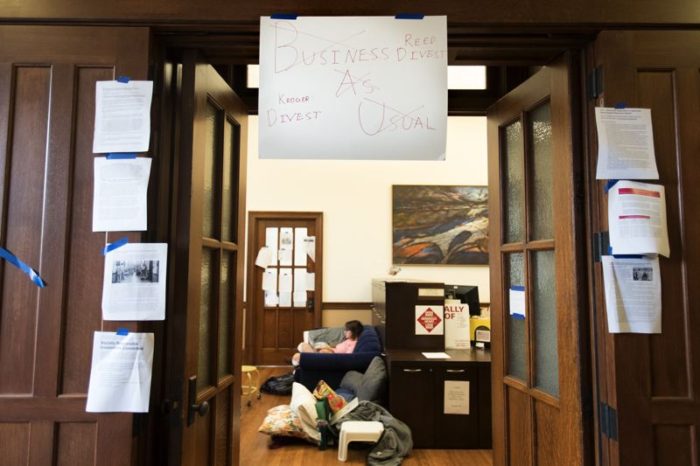

Over a backdrop of student occupation over divestment, leaked documents show Reed College one of 10 invested in an off-shore fossil fuels venture capitalist fund.
In a series of investigative stories called The Paradise Papers, Southeast Portland’s Reed College is named as an investor in a secret Cayman Islands fossil fuels fund.
The investment product, with nine other school investors, comes through EnCap, a financial firm providing venture capital to oil and gas companies.
The reporting may spark new pressure on the college to consider social and environmental goals in its investment strategy.
Reed College‘s student body has long been active in divestment movements, including a current sit-in since Oct. 23 in the president’s office and hallway to protest the college’s investment in Wells Fargo. (The activists say the bank has invested in private prisons, which Wells Fargo officials deny, and the controversial Dakota Access Pipeline, of which it is one investor.)
Fossil Free Reed has been pushing for many years for the college to also divest from fossil fuels. Reed Magazine wrote that in July 2014, the chairman of the board declined to disinvest from fossil fuels citing its Investment Responsibility Policy.
The policy, in effect since 1978, says that the College should remain neutral on political matters. After an occupation of the president’s office in 1980, the college also decided against disinvestment in apartheid South Africa.
The Nov. 8 New York Times piece — Endowments Boom As Colleges Bury Earnings Overseas — is based on leaked data to the International Consortium of Investigative Journalists regarding trillions of dollars of investments in off-shore accounts.
Kevin Myers, a spokesman for the college, said the insinuation that Reed is sheltering its money from taxes is false. Reed is a nonprofit and therefore doesn’t pay taxes, he said.
Reed’s $555 million endowment is also a small drop in the bucket compared to the more than $500 billion nationwide in such accounts at institutions of higher education.
Myers said the investments outlined in the piece are not nefarious nor illegal, it’s simply the way things are done in the world of high finance.
“They’re just super complicated investment vehicles,” he said. “That’s just kind of the mechanism for how that’s done. It’s just kind of a way that certain investment managers make it easier.”
Reed students are unlikely to stop calls for divestment any time soon.
“We said that we wanted Reed to come forward and state what they were invested in,” said Tiffany Chang, one of the students occupying the president’s office. “They claimed that they did not have any ties to unethical corporations, which is clearly a lie.”

Myers said even as a spokesman he is not privy to what investments the college makes, as many are made with agreements not to disclose sensitive information on investment strategies. He also said a board of trustees member could not comment on the issue.
“Nobody’s going to talk about what our current investments are,” Myers said.
Shasta Kearns Moore
Reporter
971-204-7864
email: This email address is being protected from spambots. You need JavaScript enabled to view it.
Follow us on Twitter
Visit Us on Facebook
more recommended stories
 Fentanyl Seizures at Border Continue to Spike, Making San Diego a National Epicenter for Fentanyl Trafficking
Fentanyl Seizures at Border Continue to Spike, Making San Diego a National Epicenter for Fentanyl TraffickingFentanyl Seizures at Border Continue to.
 Utah Man Sentenced for Hate Crime Attack of Three Men
Utah Man Sentenced for Hate Crime Attack of Three MenTuesday, August 8, 2023 A.
 Green Energy Company Biden Hosted At White House Files For Bankruptcy
Green Energy Company Biden Hosted At White House Files For BankruptcyAug 7 (Reuters) – Electric-vehicle parts.
 Former ABC News Reporter Who “Debunked” Pizzagate Pleads Guilty of Possessing Child pδrn
Former ABC News Reporter Who “Debunked” Pizzagate Pleads Guilty of Possessing Child pδrnFriday, July 21, 2023 A former.
 Six Harvard Medical School and an Arkansas mortuary Charged With Trafficking In Stolen Human Remains
Six Harvard Medical School and an Arkansas mortuary Charged With Trafficking In Stolen Human RemainsSCRANTON – The United States.
 Over 300 People Facing Federal Charges For Crimes Committed During Nationwide Demonstrations
Over 300 People Facing Federal Charges For Crimes Committed During Nationwide DemonstrationsThe Department of Justice announced that.
